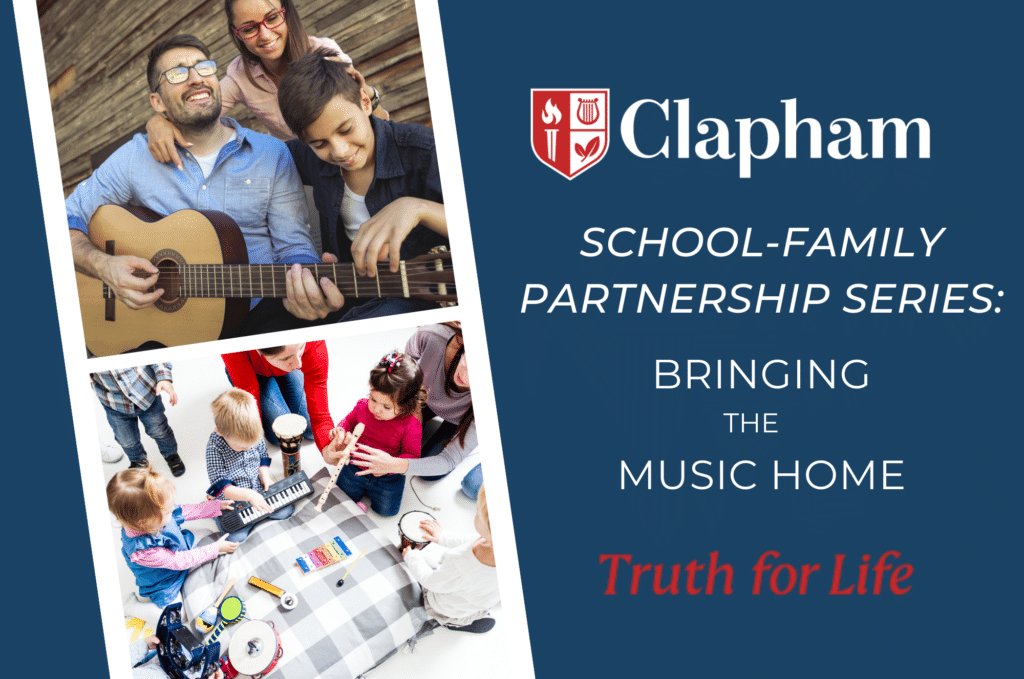
This is the third in a series on school-family partnership. We’re seeking responses to the following question: “How can families support and continue the life-giving education their children receive daily at Clapham?” Clapham teacher and mother Julie LeMahieu encourages us to be a music teacher in our homes.
In a modern society of experts, it’s easy to dismiss or flat-out avoid pursuits in which we are not particularly skilled. When examples of perfection are a click or swipe away, we compare ourselves to the best and figure we had better not even attempt. The thought process goes something like this: Why should I bake that pastry when I can buy one from an experienced pâtissier? Or why would I sing a song when I can play a beautiful recording of a professional?
You don’t have to be a professional!
In some cases, this is a healthy mindset. If I need heart surgery, I had better ask a heart surgeon’s opinion and not rely on my own research or surgical skills! Yet it’s this expert-only attitude towards music—this idea that either I’m a musician or I’m not—that I’d like to challenge because it has implications for how we foster our children’s growth, musically and otherwise.
If, like most people, you are not a professional musician or even someone who regularly participates in a musical ensemble (e.g., a church choir or municipal band) you probably do not consider yourself qualified to teach your children much about music. Yet you are your child’s primary musical teacher from infancy (or, for biological children, even before birth) through at least the elementary school years.

How so? The music you play, the lullabies you sing, the marching around the house and the banging of wooden spoons on pot lids on the kitchen floor make up your child’s early musical learning. Don’t shy away from this privilege just because your voice does not sound like that of a Grammy nominee.
Sing and make music!
Sing to and with your kids—church songs, folk songs, Christmas songs, and so on—really any songs are better than no songs. In music class at Clapham, I give students a variety of folk songs from around the world in addition to patriotic American songs and hymns that they can add to their personal repertoire. Play music you like of a variety of genres. Play instrumental music and talk about the tempo (how fast or slow it is) the dynamics (how loud or quiet it is), and the instrumentation (which instruments you hear). I encourage younger students to imitate me in expressing various elements of music. You can, too! Walk, march, hop, or skip to the beat of the music; use movements to reflect the piece’s dynamics; or tap the rhythm using anything—including wooden spoons.

Listen to others sing and make music!
Go to concerts (DuPage Symphony, Wheaton College, Camerata Chicago, Memorial Park, and even the Wheaton Public Library offer local options) to watch musicians in action or, at the very least, go to church and pay attention to what is played in worship. Love for music can be caught, not just taught, in a formal sense. Repeated exposure and engagement in musical experiences are paramount to your child’s early musical development. Early childhood music classes in the area, including Music Together and Musikgarten, are examples of exposure programs for children, helping foster a love for music early on.
For parents of older children, it’s not quite so easy, but it’s still possible to encourage love for music and even skill development. Your older children have opinions about the music they want to hear. Talk about their preferences and take turns choosing music for listening. And, while kitchen floor bands and living room dance parties may not be as popular with tweens and teens, there are ways to share in music-making together: attend concerts, take up an instrument, or join the church choir with your child, modeling lifelong learning. It is possible to improve as a practitioner of music at any age. As I tell my Middle School choir students each year, you may not consider yourself a “singer,” but the Lord has given you your voice to worship Him, and you can grow in producing beautiful music, no matter your age!

In our society of experts, it’s easy to put pressure on ourselves and our children to be excellent or else. While we value excellence, as it reflects the beauty and perfection of our Heavenly Father, we also value joyful discovery and the process of lifelong learning. As parents, we can model what it looks like to learn new skills, to make mistakes, to try our best and to do, whatever it is (even making music), as unto the Lord (Col. 3:23-24) for His glory.

Julie LeMahieu has been Clapham’s music teacher since 2017 and has taught elementary school music, early childhood music, choir, and private lessons since 2007. She and her husband, Nathan, met as undergraduate music majors. They continue to work at creating a musically rich home environment for their three children.
